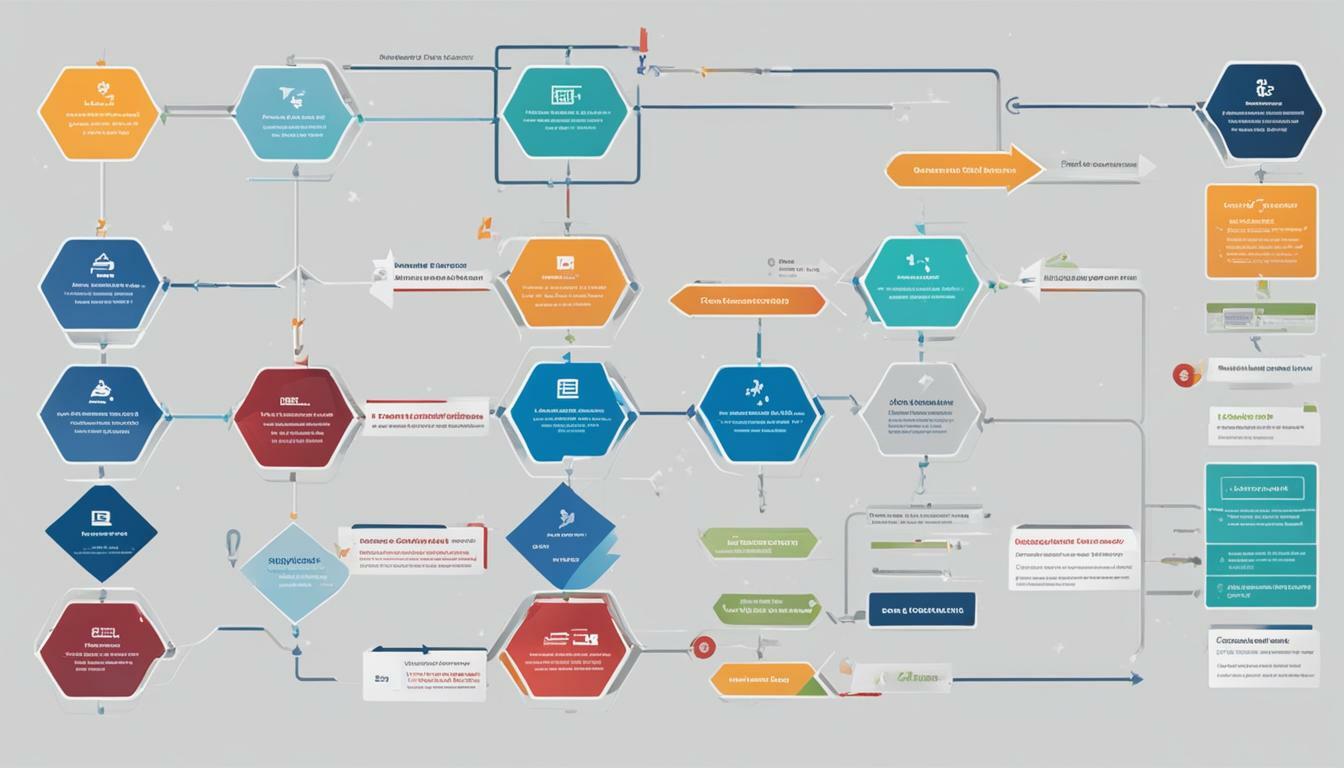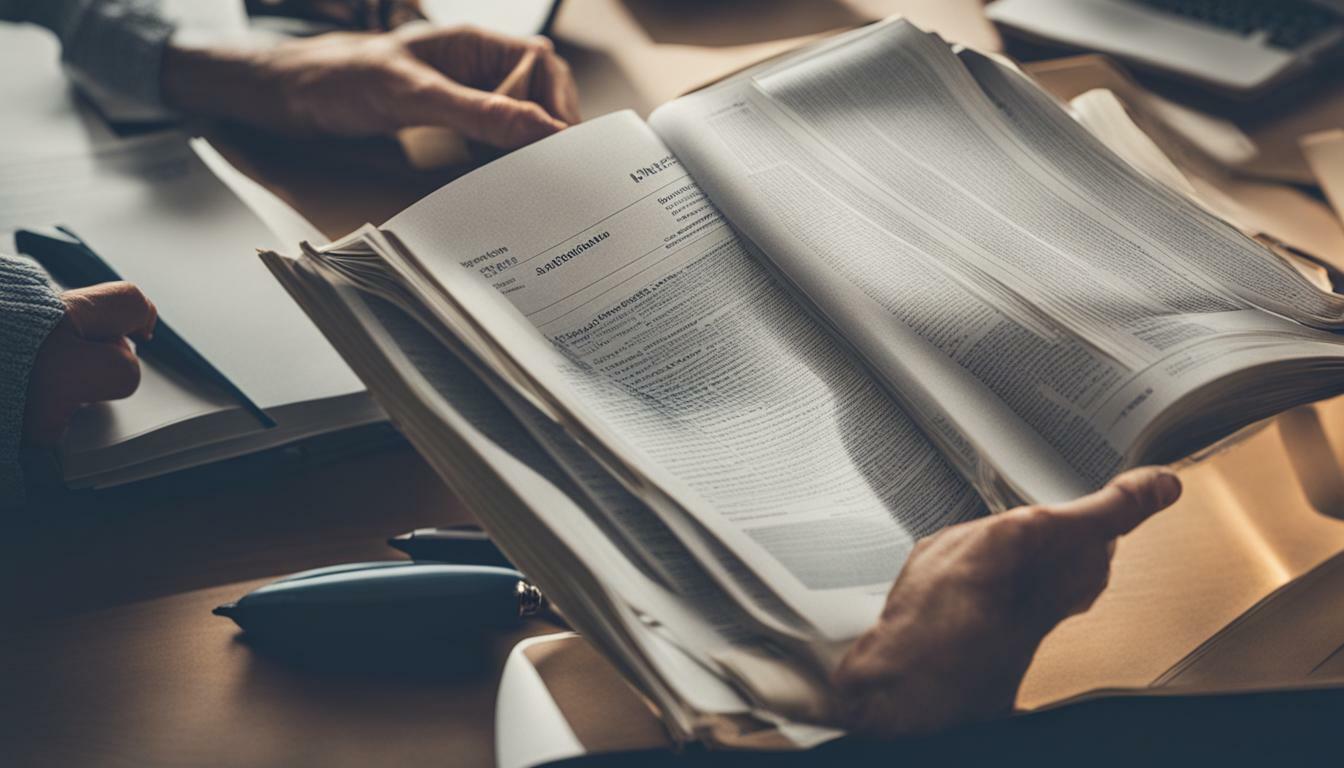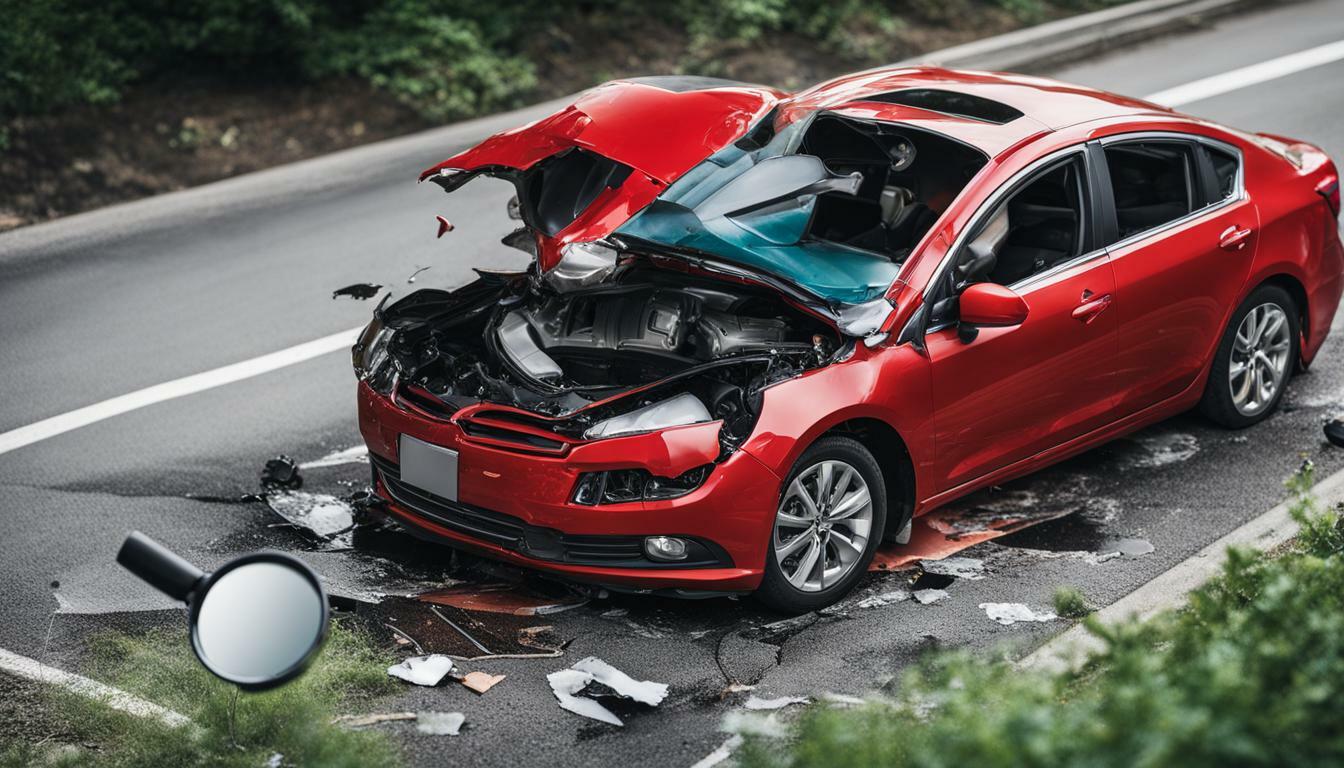Accidents happen, and when they do, having collision insurance can give you peace of mind knowing that the costs of any damages will be covered. However, filing a collision insurance claim can be a daunting process for many drivers. That’s why in this article, I will guide you through the entire collision insurance claim process, explaining everything from the basics of collision insurance to navigating the process with insurance adjusters.
By understanding the process of filing a collision insurance claim, you can save time and ensure that you receive a fair settlement. So let’s get started!
Key Takeaways:
- Filing a collision insurance claim can be a complex process, but understanding the steps involved can help you navigate it more confidently.
- Gathering necessary documentation is crucial to supporting your claim and increasing your chances of a successful outcome.
- Proper communication with your insurance company and insurance adjusters can help ensure a fair settlement offer.
Evaluating Your Collision Insurance Coverage and Requirements
Before filing a collision insurance claim, it’s important to assess your policy’s coverage and the specific requirements set by your insurance company.
Collision insurance claim coverage protects you in case of an accident where your vehicle collides with another vehicle or object. It typically covers damages to your vehicle up to its actual cash value, minus your deductible. It’s important to review your policy to understand the extent of your coverage and ensure it meets your needs.
Collision insurance claim requirements may vary depending on your insurer. Some common requirements may include notifying your insurer of any accidents within a certain timeframe, providing detailed information about the accident, and submitting relevant documentation. It’s essential to review your policy and fulfill any necessary requirements to ensure a successful claim.
When evaluating your collision insurance coverage and requirements, it’s often helpful to consult with your insurance agent or representative. They can provide guidance on your policy’s terms and conditions and answer any questions you may have.
Gathering Essential Documentation for Your Collision Insurance Claim
When it comes to filing a collision insurance claim, one of the most critical elements is having the right documentation to support your case. Without proper documentation, your claim might get denied or delayed, leading to unnecessary stress and financial strain.
Here are some essential documents you should gather when filing a collision insurance claim:
- Police Report: If a police officer came to the scene of the collision, they should have filed a report documenting the accident. This report is essential in providing details such as the time, location, and parties involved in the collision.
- Evidence of Damage: Take photos of the damages to your vehicle, as well as the other party’s vehicle, if applicable. These photos can help your insurance adjuster better understand the extent of the damages.
- Medical Records: If you or any passengers in your vehicle sustained injuries, make sure to obtain medical records detailing the extent of the injuries and any treatments received.
- Witness Statements: If there were any witnesses to the collision, try to obtain their contact information and a statement about what they saw. Witness statements can often help confirm the details of the accident.
- Expenses and Receipts: Keep all receipts related to the collision, such as receipts for towing services or car rentals. These expenses can be added to your claim.
Having these documents readily available can speed up the claims process and increase the chances of a successful claim. Make sure to keep copies of all documents and submit them to your insurance adjuster as soon as possible.
Filing a Collision Insurance Claim: Tips for Reporting the Collision to Your Insurance Company
Reporting a collision to your insurance company is a crucial step in filing a collision insurance claim. It’s important to communicate the details of the accident and file your claim correctly to ensure timely and efficient processing. Here are some tips to help you navigate this step:
1. Contact your insurance company as soon as possible
It’s important to report the collision to your insurance company as soon as possible, typically within 24-72 hours. Delaying the reporting process may harm your chances of a successful claim. Most insurance companies provide a 24/7 hotline to report the collision and begin the claim process. Be sure to provide as many details as possible, including the date, time, and location of the collision.
2. Provide accurate and detailed information
When reporting the collision, provide accurate and detailed information about the damages and injuries sustained. Describe the incident, the damages to your vehicle, and any injuries you or your passengers may have sustained. Even if you are unsure of certain details, provide as much information as you can to your insurance company.
3. Follow up with your insurance company
Keep in touch with your insurance company throughout the claim process to ensure timely and effective processing. Ask for a reference number or claim number and keep this for your records. Follow up regularly to ensure your claim is being processed and to address any concerns or questions you may have.
4. Be honest and transparent
Be honest and transparent with your insurance company throughout the claim process. This includes providing accurate details about the accident and any damages or injuries sustained. Any misrepresentations or inconsistencies may harm your chances of a successful claim.
Reporting a collision to your insurance company can be a stressful experience, but by following these tips, you can effectively communicate the details of the accident and file your claim with confidence.
Navigating the Process with Insurance Adjusters
After filing your collision insurance claim, you may interact with insurance adjusters who will assess the damages and determine the settlement offer. It is essential to understand that insurance adjusters work for the insurance company, not for you. Their primary goal is to minimize the amount of money paid out for the claim. Therefore, it is crucial to know how to communicate effectively to maximize your claim’s outcome.
If you feel uncomfortable or unsure about handling the negotiations with the adjuster, do not hesitate to hire a professional attorney or public adjuster for assistance. They can help you navigate the process and ensure that you receive the best possible outcome.
When communicating with the insurance adjuster, it’s crucial to provide all necessary documentation and details of the accident. Be honest and straightforward in your communication. Avoid giving unnecessary or conflicting information that can be used against you. Remember that insurance adjusters are skilled negotiators and may try to get you to settle for less than the actual damages.
If you believe that the settlement offer is low or unfair, do not hesitate to negotiate. Provide evidence and documentation that support your claim and highlight any additional expenses or losses that were not initially considered. Negotiation can take time and may involve several rounds of back-and-forth communication, but it can result in a fair settlement.
Remember that the goal is to receive the appropriate compensation for your losses. Keep all communication professional and courteous, even if the negotiation process becomes frustrating. With a little patience and persistence, you can successfully navigate the process with insurance adjusters and receive the compensation you deserve.
Assessing the Collision Insurance Claim Settlement
Once the insurance adjuster has evaluated your collision insurance claim, they will present you with a settlement offer. It’s essential to assess the settlement offer you receive and ensure it’s fair compensation for the damages you’ve incurred.
One of the first steps you can take is to review your policy’s coverage limits to determine if the settlement offer meets your coverage criteria. If the offer doesn’t meet your coverage limit, you have the right to negotiate with the insurance company to increase the compensation.
It’s also vital to review the details of the settlement offer, which should include the total amount you will receive and how the settlement will be paid out. You can expect to receive a lump sum payment for the damage to your vehicle, but it’s critical to ensure that any additional expenses, such as rental car fees and medical bills, are also included in the settlement.
If you have any questions or concerns about the settlement offer, don’t hesitate to reach out to your insurance adjuster. They are there to help you navigate the claim process and can provide you with more information about the settlement details.
If you’re not satisfied with the settlement offer, you have the right to negotiate with the insurance adjuster to increase the compensation. Prepare a counteroffer that includes a detailed breakdown of the damages and expenses you’ve incurred and the compensation you believe is fair.
Keep in mind that negotiating with the insurance company can be a complex process, and it’s essential to remain calm and professional throughout the conversation. You can also consider hiring a lawyer or seeking assistance from a consumer protection agency to ensure you receive fair compensation.
Conclusion
Assessing the settlement offer for a collision insurance claim is a critical step in the claim process. By reviewing your policy’s coverage limits and assessing the details of the settlement offer, you can ensure that you receive fair compensation for the damages you’ve incurred. If you’re not satisfied with the offer, don’t hesitate to negotiate or seek assistance to ensure that your rights are protected.
Conclusion
Filing a collision insurance claim can seem overwhelming, but with the proper guidance, you can navigate the process more confidently. Remember to assess your coverage and fulfill any necessary requirements before gathering essential documentation such as the police report and documentation of damages and expenses.
When reporting the collision to your insurance company, communication is key. Be sure to effectively communicate the details of the accident and file your claim promptly. Throughout the process, you may interact with insurance adjusters, who play a critical role in evaluating the damages and determining the settlement offer. Remember to communicate effectively with the adjusters and assess the settlement offer to ensure a fair resolution.
By following the steps outlined in this article, you increase your chances of a successful outcome. Remember, the goal of collision insurance is to provide financial protection in the event of an accident, so don’t hesitate to reach out to your insurance company for assistance if needed.
FAQ
Q: What is collision insurance?
A: Collision insurance is a type of auto insurance coverage that helps pay for repairs or replacement of your vehicle if it is damaged in a collision with another vehicle or object, regardless of who is at fault.
Q: How do I file a collision insurance claim?
A: To file a collision insurance claim, you need to contact your insurance company and provide them with details about the accident, such as the date, time, and location. They will guide you through the claim process and provide you with the necessary forms to complete.
Q: What documentation do I need for a collision insurance claim?
A: When filing a collision insurance claim, you will typically need the police report, photos of the damage, estimates from repair shops, and any other relevant documentation that supports your claim. Your insurance company will provide specific instructions on the required documentation.
Q: How long does it take to process a collision insurance claim?
A: The time it takes to process a collision insurance claim can vary depending on the complexity of the claim and the responsiveness of all parties involved. It is best to contact your insurance company for an estimated timeline for your specific claim.
Q: Can I choose any repair shop for my collision insurance claim?
A: Most insurance policies allow you to choose your preferred repair shop for collision repairs. However, some insurance companies may have a list of approved repair shops that offer certain benefits or guarantees. Check with your insurance company to understand your options.
Q: What if my vehicle is totaled in a collision?
A: If your vehicle is deemed a total loss, meaning the cost of repairs exceeds the value of the vehicle, your insurance company will provide you with a settlement based on the actual cash value of your vehicle. This amount can be used towards purchasing a replacement vehicle.
Q: Can I dispute a collision insurance claim settlement?
A: Yes, you can dispute a collision insurance claim settlement if you believe it is unfair or inadequate. Contact your insurance company to discuss your concerns and provide any additional documentation or evidence to support your case. They will review your dispute and reassess the settlement if necessary.



